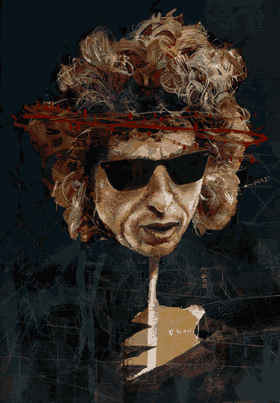
"I'm only Bob Dylan when I have to be."
--Bob Dylan
The Mission was bitchin' cold. It was an ominous date: April 1, 1999 -- Holy Thursday, Passover, All Fool's Day, and the second blue moon of the last year of the millennium. The show was the closing event for "The Art of Midnight Editing," documenting twenty-two years of the Billboard Liberation Front. The entrance had been spruced up with images from Apple's "Think Different" campaign, featuring a young Dylan with the caption, "He not busy being born is busy buying" -- and the young crowd of anarchist soap-dodgers was primed to be pranked.
Opening for Positivland (an obvious play on famed culture jammers Negativland) was a supposed band called God Nose. The flyer, loaded with Bob Dylan indicia and a striking nasal profile, made it clear exactly whose nose they had in mind. Four musicians on risers in front of the main stage began a dubby reggae groove as the radio voice of Jumpin' Jack Jackson (Negativland's reanimated cryogenic sixties DJ) erupted:
"Your Attention Please!...What more can one say about the artist behind God Nose that hasn't already been said since he first burst from the cool Midwestern clouds of obscurity into the white-hot, clear-light vistas of a whole new world that never quite came into view? ... Ladies and genetic material suppliers, tonight I am proud to present a 20th century legend, the man who defined a generation that hardly knew what was happening to them, Mr. Robert 'Bob' Dylan!"
In eerie blue light, "Bob" appeared in the flesh, alone on the higher stage -- wearing high-heeled boots, a black-suede Western vest, a snap collar dress shirt with a crucifix and rococo cuff links, a harmonica holder and Ray-Ban sunglasses with an enormous swirling hairdo topping it all off. You could barely make out his face under the arabesque hair, but there was a palpable aura of confrontation about him.
God Nose accelerated into the fast, punky "Hangman's Tree," a licentious outlaw song with the lines, "Don't hold religion/Just do like I please/Let's take turns going down/On our knees." Bob seemed unmoved by the applause that followed. Then he spoke in that druggy Okie drawl, "This one's called 'The Enormous Room,'" and began a slow, passionate torrent of apocalyptic imagery unrelenting in its social indictment.
Young Philistines in the crowd began to jeer and, in fairness, who could hate a song for fifteen minutes straight without fighting back? The band took the first hits -- paper airplanes falling short of the stage -- but after that initial fusillade, it became a blood sport, a contest of wills. Heavier ammo followed -- a coin grazed the psychedelic nimbus of Bob's hair and a bagel hit his suede shoulder. A primitive collective howl rose up as if from the ashes of the Burning Man. "Get off the stage," agonized a woman, sounding like she was giving birth.
In all my years of public spectacles, I had seen nothing like this. Once again, an audience was at war with itself over Dylan, highway '66 revisited with no line between ironic reference and chaos. It was like wearing a Saddam costume at a gun show. It was as if the crowd was reacting not to the act in front of them but toward the problematic leader of their parents' reviled generation himself. A biblical prophet in a mock crucifixion, unfazed Bob continued to make every word of his jeremiad inescapable.
"Get fucking loud!" quoth Bob before ending with "I'm Not You," an expression of hope in the face of Armageddon reminiscent of "All Along the Watchtower." "This life is full of trouble/The lucky ones keep their faith/Judgement shall flood our cities/There's nowhere shall be safe." As Bob pointed an accusing finger, suddenly the stage lights went out, followed by the sound system -- then quickly both came on again, all without derailing the song. (It seems a resourceful saboteur had located the fuse box.) The band played on as Bob sang the last verse, waved, walked off, and didn't look back ...
... leaving a roomful of confused hecklers.
"What the fuck was that?" one guy asked. "Was that really Bob Dylan?"
See also: Spotting Dylan
Artist and culture critic Stephen Ronan coproduced three box sets on Beat generation writers from Rhino Records.
